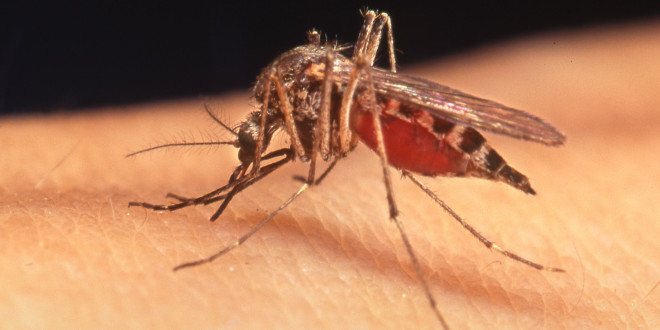HENDRICKS COUNTY – Along with Spring warmth and rain showers comes standing water and mosquito breeding. Hendricks County Health Department (HCHD) officials urge citizens to be aware of how to prevent the spread of diseases carried by mosquitoes.
“Basically, anywhere that water can pool is an ideal breeding ground for mosquitoes,” reports Krista Click, Environment Health Director for the HCHD. “For example: clogged rain gutters, flower pots, plant saucers, puddles, buckets, garden equipment, trash cans, old tires, bird baths, plastic sheeting – each of these common items can collect still water where mosquitoes lay their eggs.”
The Indiana State Department of Health (ISDH) lists the following mosquito-carried diseases as risks for Indiana residents: West Nile virus, St. Louis encephalitis, La Crosse encephalitis, and Eastern equine encephalitis. Although Zika virus and Chikungunya virus are also risks for travelers specifically, these are not locally acquired threats.
“Common symptoms of mosquito-borne illnesses may include fever, headache, nausea, vomiting, and rash,” states Dr. David Stopperich, Health Officer for the HCHD. “More serious cases can also include stiffness, swelling, and various neurological effects like tremors, seizures or coma depending on the virus.”
“By following these ten recommendations,” says Click, “mosquitoes can be prevented from breeding in your community and from biting you when they are nearby.”
- Repair failed septic systems.
- Dispose of old tires, cans, plastic containers, ceramic pots, and other containers that can hold water. The Hendricks County Solid Waste Management District also collects old tires at seasonal “Tox-Away Days.”
- Drill holes in the bottom of recycling containers that are left out of doors.
- Clean clogged roof gutters.
- Keep swimming pool covers free of standing water.
- Aerate ornamental pools or stock them with fish.
- Keep birdbaths clean and regularly empty any water from various containers which you plan to keep.
- Stay indoors between dusk and dawn when mosquitoes are most active, or use a mosquito net if staying or sleeping outside in an unscreened structure.
- Use an insect repellant containing DEET, picaridin, oil of lemon eucalyptus, PMD, or IR3535 as directed.
10. When outside, cover as much skin as possible with light colored, tightly woven clothes. Also wear shoes, socks, long pants and long-sleeved shirts, and tuck pant legs into shoes or socks. Pre-treated, insect repellant clothing is also available for purchase and use.
For more information about mosquitoes, visit the Hendricks County Health Department Environmental Health Division website at http://www.co.hendricks.in.us/health and select the Topic of Interest Vector Control, contact them at (317) 745-9217, or visit the Indiana State Department of Health’s Mosquito-Borne Diseases page at https://www.in.gov/isdh/27792.htm.






